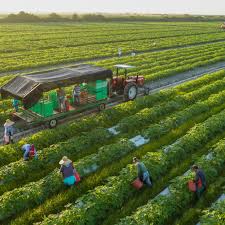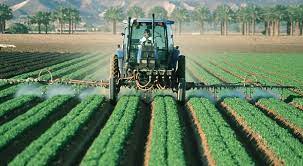
Organic farming for large-scale production presents unique opportunities and challenges, as it seeks to combine the principles of organic agriculture with the demands of high-volume output. This approach involves expanding organic farming practices to cover more extensive areas, aiming to produce significant quantities of organic crops while adhering to sustainability and environmental stewardship principles. Organic farming for large-scale production requires careful planning, innovative strategies, and a commitment to maintaining organic integrity throughout the farming process.

One of the key aspects of organic farming for large-scale production is the effective management of soil fertility. In conventional farming, synthetic fertilizers are often used to boost soil nutrients, but organic farming relies on natural methods to achieve similar results. Large-scale organic farmers utilize techniques such as composting, green manuring, and the use of organic amendments to enhance soil health. Composting involves recycling organic matter, such as plant residues and animal manure, into nutrient-rich compost that improves soil structure and fertility. Green manuring involves growing cover crops that are later incorporated into the soil to provide additional nutrients and organic matter. By employing these practices, large-scale organic farmers can maintain soil fertility over extensive areas without resorting to synthetic inputs.
Pest and disease management is another critical component of organic farming for large-scale production. In organic systems, the use of synthetic pesticides is prohibited, so farmers must rely on alternative methods to control pests and diseases. Integrated pest management (IPM) is a common approach that combines biological control, cultural practices, and mechanical methods. For example, large-scale organic farmers might use beneficial insects, such as ladybugs or parasitic wasps, to control pest populations naturally. Crop rotation and diversification are also essential strategies for disrupting pest and disease cycles. By planting a variety of crops and rotating them across different seasons, farmers can reduce the prevalence of pests and diseases that target specific crops.
Technology and innovation play a significant role in optimizing organic farming for large-scale production. Advances in technology have introduced tools and systems that enhance efficiency and productivity while maintaining organic standards. For instance, precision agriculture technologies, such as GPS-guided tractors and automated irrigation systems, allow for more accurate and efficient management of large-scale organic farms. Drones and remote sensing technologies can provide valuable data on crop health and soil conditions, enabling farmers to make informed decisions and implement targeted interventions. These technological advancements help large-scale organic farmers manage their operations more effectively and sustainably.
Another important consideration in large-scale organic farming is the management of labor and resources. Organic farming typically requires more hands-on management and labor compared to conventional methods, as farmers must manually manage tasks such as weeding and pest control. To address this challenge, large-scale organic farms may invest in specialized equipment and machinery designed to handle organic farming tasks efficiently. For example, mechanical weeders and harvesters can help reduce the labor required for these tasks, improving overall productivity. Additionally, training and educating farm workers on organic practices and principles is crucial for ensuring that they can effectively manage large-scale operations while adhering to organic standards.
Market access and certification are also critical factors in large-scale organic farming. Obtaining organic certification is a necessary step for farmers who wish to sell their products as organic. Certification involves meeting specific standards and undergoing regular inspections to ensure compliance with organic regulations. Large-scale organic farmers must navigate the certification process and maintain detailed records of their practices to demonstrate their adherence to organic standards. Additionally, establishing strong market connections and distribution channels is essential for successfully selling organic products. Farmers may need to collaborate with distributors, retailers, and certification bodies to ensure that their products reach consumers and meet market demand.
Sustainability is a core principle of organic farming for large-scale production. By prioritizing practices that protect the environment, conserve resources, and promote biodiversity, large-scale organic farmers contribute to the long-term health and resilience of agricultural systems. Sustainable practices, such as reducing water usage, minimizing soil erosion, and enhancing biodiversity, are integral to maintaining the integrity of organic farming and ensuring its continued success at a large scale. Large-scale organic farmers must continuously evaluate and adapt their practices to align with sustainability goals and address emerging challenges.
In conclusion, organic farming for large-scale production represents a significant and growing sector within the agricultural industry. By employing strategies such as effective soil management, pest and disease control, technological innovation, and sustainable practices, large-scale organic farmers can achieve high levels of productivity while adhering to organic principles. The success of organic farming at this scale depends on careful planning, resource management, and a commitment to maintaining organic integrity. As the demand for organic products continues to rise, large-scale organic farming will play a vital role in meeting consumer needs while supporting environmental sustainability and agricultural resilience.









